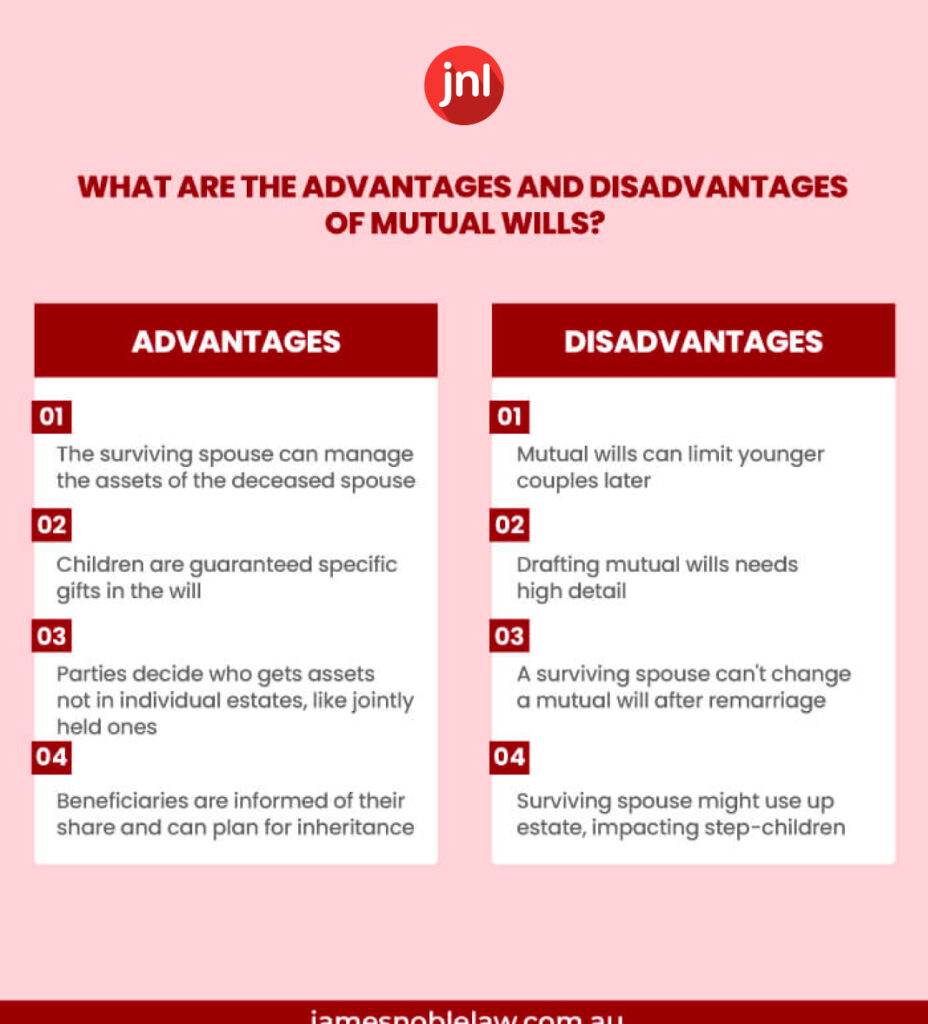
What is a Mutual Wills?
 Mutual wills are considered a ‘legally binding contract’ between two people that are drafted in terms agreed upon by both parties and cannot be revoked or amended by either party without the agreement of the other. This means that following the death of the first party, the wills are irrevocable and changes can never be made by the surviving party (unless otherwise provided for).
Mutual wills are considered a ‘legally binding contract’ between two people that are drafted in terms agreed upon by both parties and cannot be revoked or amended by either party without the agreement of the other. This means that following the death of the first party, the wills are irrevocable and changes can never be made by the surviving party (unless otherwise provided for).
Most commonly, mutual wills are used in circumstances where parties have remarried with children from a former marriage. This is because mutual wills require parties to agree on the beneficiaries, and a surviving spouse cannot disinherit their step-children. In saying this, mutual wills may be made between any two people wishing to combine their estate plan.
What are the advantages of Mutual Wills?
 The surviving spouse is free to deal with the assets of their deceased spouse.
The surviving spouse is free to deal with the assets of their deceased spouse. - Parties are assured that their children will be left with particular gifts upon their death.
- Parties get to decide which beneficiaries will be entitled to the assets that may not form part of the estate of each individual. For example, jointly held assets or assets held by one party only.
- Beneficiaries receive notification of their interest in the estate and will have the opportunity to prepare for an anticipated inheritance.
What are the disadvantages of Mutual Wills?
- Mutual wills may be limiting for younger couples in the future.
- Drafting of mutual wills requires a high level of detail.
- If a surviving spouse has a mutual will with their deceased spouse, they will be unable to update the will to accommodate their new marriage.
- A surviving spouse may reduce the effect of a mutual will by using up the majority of funds in the estate, leaving very little for the surviving spouse’s step-children.
- Mutual wills do not offer flexibility or anticipate for unexpected events following the death of the first spouse.
Can Mutual Wills be subjected to Family Provision Claims?
 Importantly, creating a mutual will does not prevent people from bringing a Family Provision Claim against the estate. This became known in the High Court of Australia decision in the matter of Barnes v Barnes.
Importantly, creating a mutual will does not prevent people from bringing a Family Provision Claim against the estate. This became known in the High Court of Australia decision in the matter of Barnes v Barnes.
It was decided the deceased’s adopted daughter was entitled to make a family provision claim, despite the existence of a valid Mutual Will which expressly passed property of the estate to their son.
Clearly, mutual wills are complex and should not be created without an understanding of the agreement. They should be carefully drafted including considerations of the following:
- The specific assets which are the subject of the agreement.
- The powers of the survivor to deal with the estate during their lifetime.
- The nomination of trustees and their powers.
Are you still wanting to make a Mutual Will?
If you still feel as if a mutual will is suitable to your circumstances, the experienced Brisbane family lawyers team at James Noble Law is here to assist. Contact us on 07 2112 3947 or make an enquiry to arrange a free and no-obligation consultation. No-obligation 20-minute consultation. To schedule an appointment with one of our Qualified and experienced Family lawyers Brisbane.
Find Brisbane family lawyers on Google Maps near you.
Helpful Family Law Documents & Guides
- A Guide to Children Negotiation and Family Law
- A Guide to Property & Family Law Act Paper
- A Guide to Alternative Dispute Resolutions
- A Guide to Preparing for the unthinkable
- A Guide to Collaborative Practice Paper
- A Guide to Separation in Family Law
- A Guide to Family Law Property
- A Guide to Dispute Resolution
- A-Z Collaborative Law eBook
- A Guide to Separation
- A Guide to Children
- Arbitration eBook


 The surviving spouse is free to deal with the assets of their deceased spouse.
The surviving spouse is free to deal with the assets of their deceased spouse. 